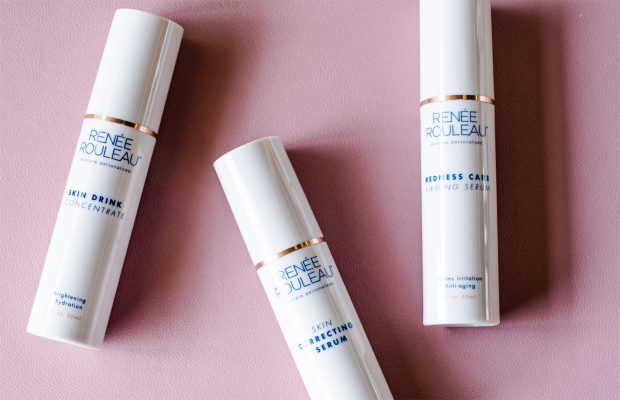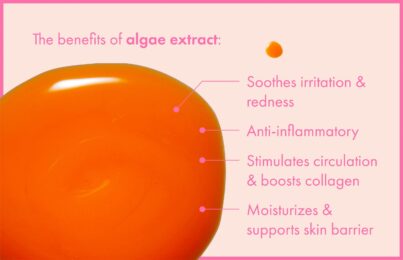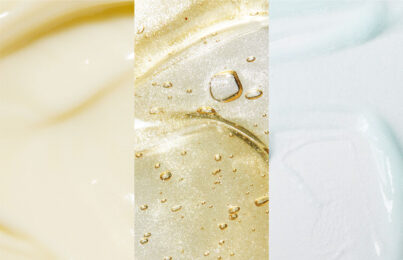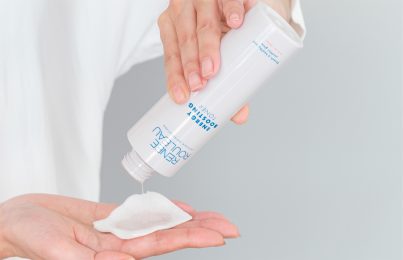Updated 06/01/22. For many years, the recommended daily skincare routine was simple: a gentle cleanser, an alcohol-free toner, and moisturizer. That was it. These days, thanks in part to incredible advancements in the skincare industry, there are a plethora of new products and product categories—including serums. But what is a face serum, really? Despite the fact that so many of us use them every day, it’s hard to define what they are and what they do. After all, they can offer a wide range of benefits, doing everything from helping to clear blemishes to firm the skin, fade brown spots, and more. Ahead, learn everything you need to know about serums!
First, What Is a Face Serum?
While they can offer a variety of benefits depending on how they’re formulated and what skin type they’re meant for, a face serum is anything that has a gel or lotion consistency that contains a high concentration of active ingredients.
While using a cleanser, toner, and moisturizer is still the foundation of a solid skincare routine, serums are a great addition and can boost results. Simply put, if you want to up your game, serums are the way to go. In fact, I always recommend that my clients add this simple step. Usually, once they do, they see big improvements.
What Are Some Common Ingredients Found in Serums?
For Clearing and Preventing the Appearance of Blemishes
Ingredients like beta-glucan, salicylic acid, zinc, tea tree, and manuka honey are often used in serums for clearing and preventing blemishes. That’s because they target blemish-causing bacteria and calm redness and irritation.
For Addressing Sun Damage and Smoothing Wrinkles
Retinol is the best and most biologically active ingredient for addressing sun damage and signs of aging like lines and wrinkles. If this is your top skin concern, I highly recommend you start using a retinol serum, like the Advanced Resurfacing Serum. Before you jump in, though, I recommend reading the beginner’s guide to using retinol and retinoids. It will give you all the best tips and tricks for avoiding dryness and irritation.
For Calming Redness and Sensitivity
Ingredients like sea whip, water lily, red marine algae, aloe vera, licorice root, green tea, white tea, and zinc are commonly found in serums for sensitivity. They all help to ease redness and irritation. Over time, they help soothe inflammatory damage.
For Hydrating the Skin
Ingredients like panthenol, hyaluronic acid, and allantoin are all used in serums meant for hydration. They infuse skin cells with water-based hydration to prevent dryness and the formation of fine lines. Trust me—a good hydrating serum can dramatically improve the overall health and integrity of the skin. (Check out my 7 favorite hydrating ingredients.)
For Addressing the Loss of Tone
If you’re concerned with loose or sagging skin, peptides are your best friend. Over time, using a serum with peptides can actually help build and protect collagen and elastin in the skin. This contributes to a firmer appearance. I formulated many of the products in my own line with peptides, such as palmitoyl tripeptide-38, palmitoyl tetrapeptide-7, and palmitoyl oligopeptide.
For Exfoliating the Skin
Exfoliating acids like glycolic, lactic, malic, and tartaric acids are excellent for dissolving and digesting cellular buildup. This leads to a smoother, brighter, and more youthful-looking complexion. That’s why I always recommend using an exfoliating acid serum a few nights a week under moisturizer.
For Fading Brown Spots and Discoloration
One of the most popular ingredients in serums meant for fading brown spots and discoloration is vitamin C. It’s a powerful antioxidant that suppresses melanin activity. There are many different types of vitamin C, but my favorites are ascorbyl methylsilanol pectinate and tetrahexyldecyl ascorbate. They’re what I chose to use in the Vitamin C&E Treatment.
Is There Anything I Should Avoid in a Serum?
There are a few ingredients I recommend avoiding when it comes time to choose a serum. They include SD alcohol 40, denatured alcohol, and heavy oils. That’s because alcohol ingredients can be very dehydrating. With use, they can actually encourage dry skin cell build-up. As for oils, I’ve seen many face oils marketed as serums. I’m not on board with this since serums generally deliver water-soluble ingredients to the skin which can readily penetrate it. If you apply an oil, then follow with something that’s water-soluble, it won’t be able to penetrate. Plus, serums are usually made of small molecules that can deliver ingredients deep into the skin, whereas oils are made up of larger molecules that won’t be able to penetrate as deep.
How Should I Use a Serum?
Serums should be used after cleansing and toning and before moisturizing. First, cleanse your skin with a gentle sulfate-free cleanser. Then, apply an alcohol-free toner to a toning cloth and swipe it across your skin. Leave it damp and apply a dime-size amount of serum. By leaving the skin damp before you apply your serum, you’re helping the serum penetrate deeper. After all, damp skin is more permeable than dry skin!
Follow up with a moisturizer. After that, you can pat a few drops of face oil over top to seal everything in, but this is optional.
Can I Use a Serum as a Moisturizer?
No, I don’t recommend using a serum as a moisturizer. That’s because moisturizers are designed to create a protective barrier over the skin, locking moisture in and keeping irritants out. While serums do offer some hydration, they shouldn’t be used alone. They should always be sealed in with a moisturizer formulated for your skin type.
Which Serum Is Right for Me?
I believe there are 9 Skin Types—not the standard three dry, normal, and oily. Each one has different characteristics and needs. The best way to find the right serum for you is to choose one that was formulated for your specific skin type. If you don’t know your skin type, take the Skin Type Quiz! At the end of it, you’ll get personalized product recommendations (including serums).
Start using serums both morning and night. Trust me—these high-performance products can deliver major benefits!
Next, layering your serums won’t give you the best results, but here’s what will.
Celebrity Esthetician & Skincare Expert
As an esthetician trained in cosmetic chemistry, Renée Rouleau has spent 35 years researching skin, educating her audience, and building an award-winning line of products. Her hands-on experience as an esthetician and trusted skin care expert has created a real-world solution — products that are formulated for nine different types of skin so your face will get exactly what it needs to look and feel its best. Trusted by celebrities, editors, bloggers, and skincare obsessives around the globe, her vast real-world knowledge and constant research are why Marie Claire calls her “the most passionate skin practitioner we know.”




Comments:
This was very helpful. Thank you.
Posted By: a |
Thank you so much!
it was really useful for me.
Posted By: safiullah |
Thank you so so so much! I’m kind of new to this and all of the different names and types of makeup and skin products was just overwhelming. Your explanations really help and I’d just like to say thanks a lot!
Posted By: Michelle |